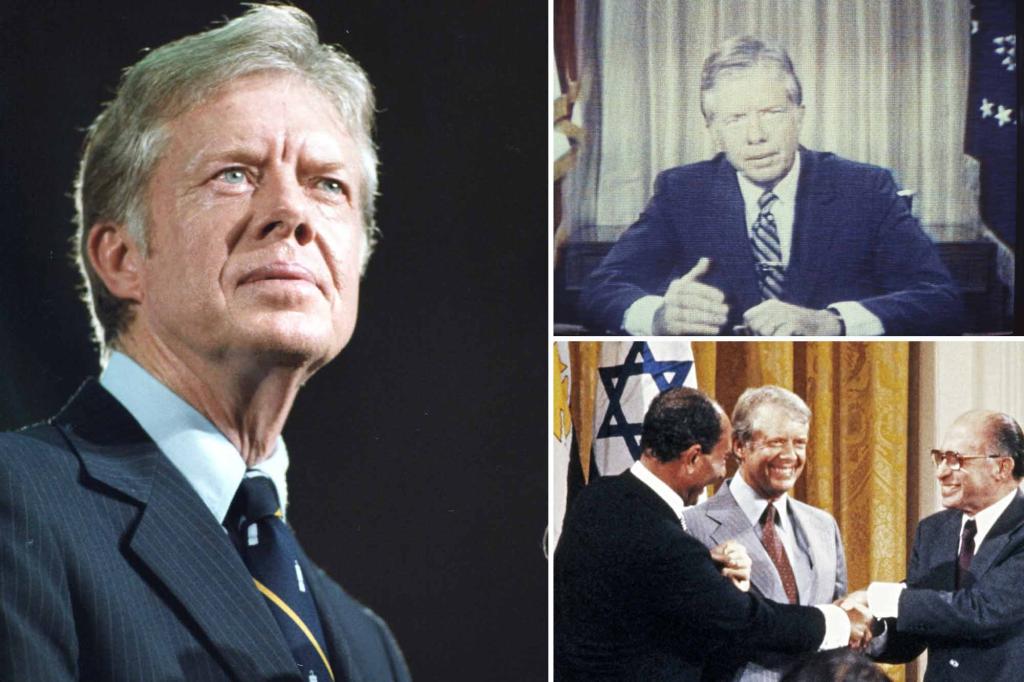Paragraph 1: The Carter Presidency: A Tumultuous Era
Jimmy Carter’s presidency, spanning from 1977 to 1981, was marked by a confluence of domestic and international challenges that tested his leadership and shaped his legacy. The former peanut farmer from Georgia entered the White House amidst the backdrop of the Vietnam War’s aftermath and a lingering sense of national unease. His administration confronted a volatile global landscape, punctuated by Cold War tensions, energy crises, and escalating conflict in the Middle East. These turbulent circumstances defined Carter’s term, forcing him to navigate complex diplomatic negotiations, address economic instability, and respond to unforeseen crises, all while striving to uphold American interests and promote peace.
Paragraph 2: Navigating International Conflicts: Camp David and Beyond
A significant portion of Carter’s foreign policy efforts focused on the Middle East. His most celebrated accomplishment was brokering the Camp David Accords in 1978, a historic peace treaty between Egypt and Israel. The 12-day summit at Camp David, where Carter personally mediated between Egyptian President Anwar Sadat and Israeli Prime Minister Menachem Begin, resulted in the first peace agreement between Israel and an Arab nation, marking a major breakthrough in the long-standing Arab-Israeli conflict. This diplomatic achievement showcased Carter’s commitment to peaceful conflict resolution and earned him global recognition. However, the Middle East presented further challenges. The Soviet invasion of Afghanistan in 1979 prompted Carter to condemn Soviet aggression, impose sanctions, and boycott the 1980 Moscow Olympics. He also oversaw the signing of the SALT II treaty with the Soviet Union, aiming to limit the nuclear arms race.
Paragraph 3: The Iran Hostage Crisis: A Defining Challenge
The Iran hostage crisis, beginning in late 1979, became a defining, and ultimately debilitating, event of Carter’s presidency. The seizure of 52 American hostages from the US Embassy in Tehran by Iranian militants created a protracted international crisis that dominated the final year of his administration. The failed rescue attempt in April 1980, which resulted in the tragic deaths of eight American servicemen, further damaged Carter’s public image and weakened his standing heading into the 1980 election. The hostages were finally released just minutes after Ronald Reagan’s inauguration in January 1981, casting a long shadow over Carter’s legacy and underscoring the complexities of US-Iran relations.
Paragraph 4: Domestic Troubles: Economic Woes and the Mariel Boatlift
Domestically, Carter grappled with a struggling economy characterized by high inflation, unemployment, and stagnant economic growth, a phenomenon known as "stagflation." The energy crisis, exacerbated by the Iranian revolution, further complicated the economic landscape. Carter’s "malaise" speech, intended to address the nation’s economic and spiritual anxieties, was perceived by many as pessimistic and further contributed to his declining popularity. Simultaneously, the Mariel Boatlift in 1980, which saw thousands of Cuban refugees arriving in Florida, presented a significant logistical and humanitarian challenge. While Carter initially welcomed the refugees, the sheer scale of the influx forced him to declare a state of emergency.
Paragraph 5: Post-Presidency: Humanitarian Work and Legacy of Peace
Following his defeat in the 1980 presidential election, Jimmy Carter embarked on a remarkable post-presidency career dedicated to humanitarian work and promoting peace. He established the Carter Center, a non-governmental organization committed to advancing human rights, promoting democracy, and resolving conflicts globally. His tireless efforts in mediating international disputes, eradicating diseases, and advocating for fair elections earned him the Nobel Peace Prize in 2002. Carter’s commitment to Habitat for Humanity, where he personally helped build homes for low-income families, further demonstrated his dedication to service and social justice. His post-presidency work redefined his image and solidified his reputation as a champion of peace and human rights.
Paragraph 6: A Complex Legacy: From Political Setbacks to Enduring Contributions
Jimmy Carter’s presidency is often viewed as a period of economic hardship and foreign policy challenges. The Iran hostage crisis, the energy crisis, and the struggling economy contributed to his single-term presidency and a decisive defeat in the 1980 election. However, his achievements in brokering the Camp David Accords and his unwavering commitment to human rights in his post-presidency years have secured his place as a significant figure in American history. Carter’s legacy is complex and multifaceted, encompassing both political setbacks and enduring contributions to peace and humanitarian causes. His post-presidency work, in particular, transformed his image from a politically embattled president to a globally respected advocate for peace and social justice. Smaller anecdotes, like his candid interview with Playboy magazine and the "killer rabbit" incident, added a touch of human fallibility to his public persona.

